Page Title
The Sacraments
Christ instituted the sacraments of the new law. There are seven:
- Baptism
- Penance
- Eucharist
- Confirmation (or Chrismation)
- Matrimony
- Anointing of the Sick
- Holy Orders
The seven sacraments touch all the stages and all the important moments of Christian life: they give birth and increase, healing and mission to the Christian's life of faith. There is thus a certain resemblance between the stages of natural life and the stages of the spiritual life.
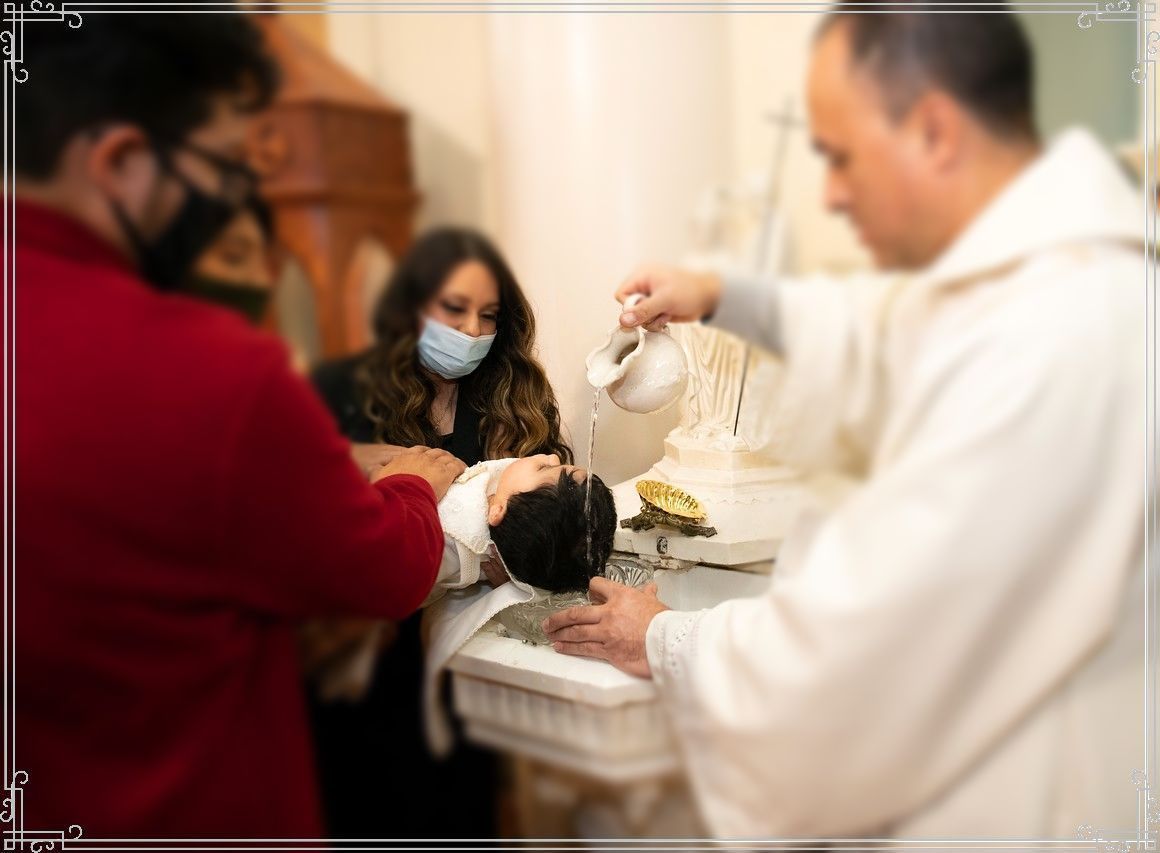
Baptism is one of the Seven Sacraments of the Christian Church. It is usually the first Sacrament received and considered the “door” of the Church. Baptism is the sacrament of regeneration by water in the word. Christ was Baptized in the Jordan and declared the necessity of this “rebirth” to Nicodemus and sent His Apostles and disciples to preach and baptize.
Baptism preparation is required for all new parents and can be scheduled by calling the church office @ 256-734-3730.
Adults wishing to be baptized should attend the OCIA classes on Monday evening during the school year. Adult Baptism is celebrated at the Easter Vigil Mass. See the OCIA page for more information.
Special circumstances may exist that require an immediate baptism and may be requested by calling the church office and asking for a priest.
Requirements:
- Parents must be registered and envelope contributing parishioners for at least four months prior to the baptism.
- A copy of the Birth Certificate must be on file in the Parish Office.
- Parents must attend a special class which focuses on the Sacrament of Baptism, and the roles and responsibilities of the parents and community which welcomes the child.
- Catholic Godparents must be mature, practicing Catholics and be at least 16 years of age. The Godparent must have received the sacraments of Baptism, First Communion, and Confirmation.
- A Christian friend or relative who is not Catholic may act as a witness. The Christian witness should be a person of active faith and a follower of Jesus Christ.
Baptisms are celebrated on Saturday after the 8:00 am Mass (9:30 am); or Sunday following the 11:30 am Mass (1:00 pm).
Call the Church Office, 256-734-3730, to make arrangements for Baptism.
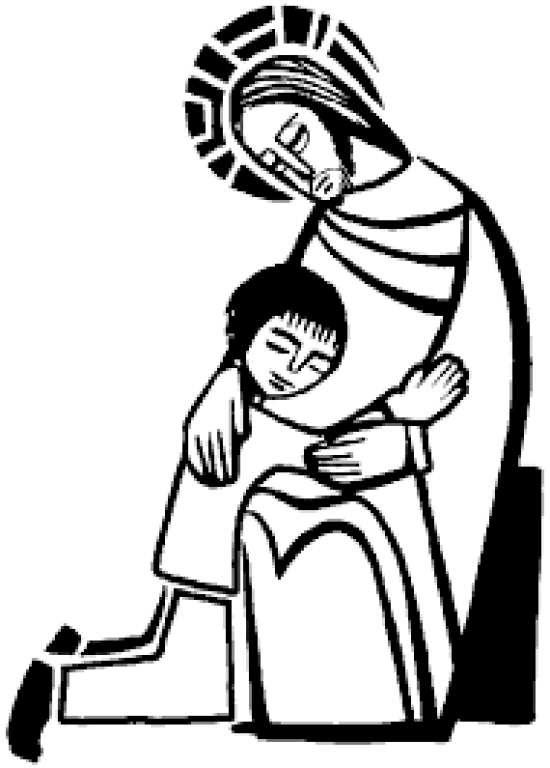
The Sacrament of Penance is an experience of the gift of God's boundless mercy. Not only does it free us from our sins but it also challenges us to have the same kind of compassion and forgiveness for those who sin against us. We are liberated to be forgivers. We obtain new insight into the words of the Prayer of St. Francis: "It is in pardoning that we are pardoned."
Jesus entrusted the ministry of reconciliation to the Church. The Sacrament of Penance is God's gift to us so that any sin committed after Baptism can be forgiven. In confession we have the opportunity to repent and recover the grace of friendship with God. It is a holy moment in which we place ourselves in his presence and honestly acknowledge our sins, especially mortal sins. With absolution, we are reconciled to God and the Church. The Sacrament helps us stay close to the truth that we cannot live without God.
"In him we live and move and have our being" (Acts 17:28). While all the Sacraments bring us an experience of the mercy that comes from Christ's dying and rising, it is the Sacrament of Reconciliation that is the unique Sacrament of mercy. -From the United States Catholic Catechism for Adults
Our usual year of First Reconciliation is grade two. Non-parochial school children should be registered in our faith formation classes in the Parish School of Religion program (PSR) at least two years prior to this sacrament. Please contact the Director of Religious Education, Fharis Richter, at 256-736-5408 or frichter@sacredheartcullman.org for more information.
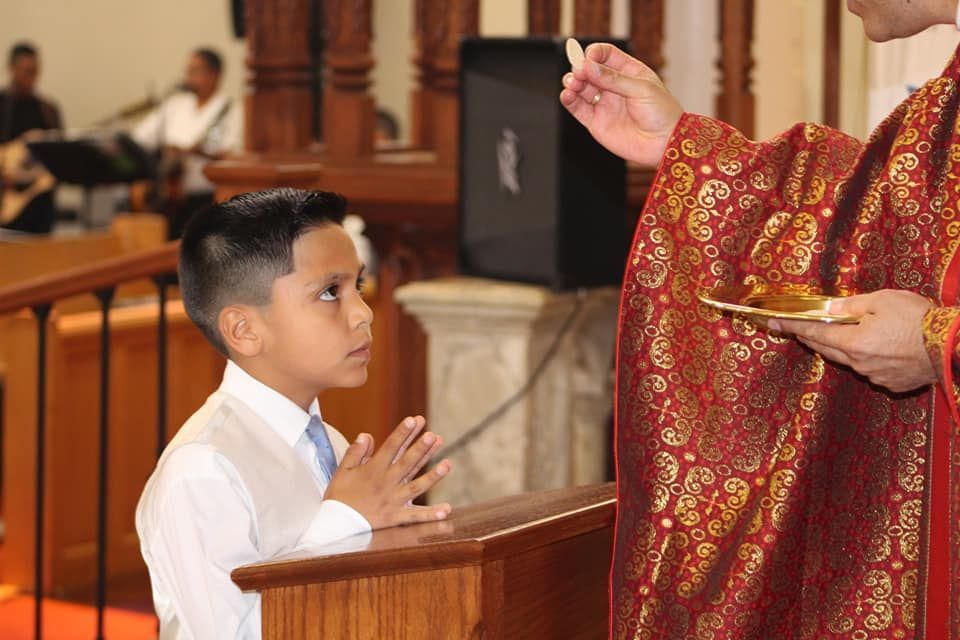
So rich is the mystery of the Eucharist that we have a number of terms to illumine its saving grace: the Breaking of the Bread; the Lord's Supper; the Eucharistic Assembly; the Memorial of Christ's Passion, Death, and Resurrection; the Holy Sacrifice of the Mass, the Holy and Divine Liturgy; the Eucharistic Liturgy; Holy Communion; and Holy Mass (cf. CCC, nos. 1328-1332).
The use of bread Eucharistand wine in worship is already found in the early history of God's people. In the Old Testament, bread and wine are seen as gifts from God, to whom praise and thanks are given in return for these blessings and for other manifestations of his care and grace. The story of the priest Melchizedek's offering a sacrifice of bread and wine for Abraham's victory is an example of this (cf. Gn 14:18). The harvest of new lambs was also a time for the sacrifice of a lamb to show gratitude to God for the new flock and its contribution to the well-being of the family and tribe.
These ancient rituals were given historical meaning at the Exodus of God's people. They were united into the Passover Meal as a sign of God's delivering the Israelites from slavery in Egypt, a pledge of his fidelity to his promises and eventually a sign of the coming of the Messiah and messianic times. Each family shared the lamb that had been sacrificed and the bread over which a blessing had been proclaimed. They also drank from a cup of wine over which a similar blessing had been proclaimed.
When Jesus instituted the Eucharist he gave a final meaning to the blessing of the bread and the wine and the sacrifice of the lamb. The Gospels narrate events that anticipated the Eucharist. The miracle of the loaves and fish, reported in all four Gospels, prefigured the unique abundance of the Eucharist. The miracle of changing water into wine at the wedding feast in Cana manifested the divine glory of Jesus and the heavenly wedding feast in which we share at every Eucharist.
In his dialogue with the people at Capernaum, Christ used his miracle of multiplying the loaves of bread as the occasion to describe himself as the Bread of Life: "I am the living bread that came down from heaven. . . Unless you eat the flesh of the Son of Man and drink his blood, you do not have life within you" (Jn 6:51, 53). —From the United States Catholic Catechism for Adults
Our usual year of First Holy Communion is grade two. Non-parochial school children should be registered in our faith formation classes in the Parish School of Religion program (PSR) at least two years prior to this sacrament. Please contact Fharis Richter, the Director of Religious Education, at 256-736-5408 or frichter@sacredheartchurchcullman.org for more information.
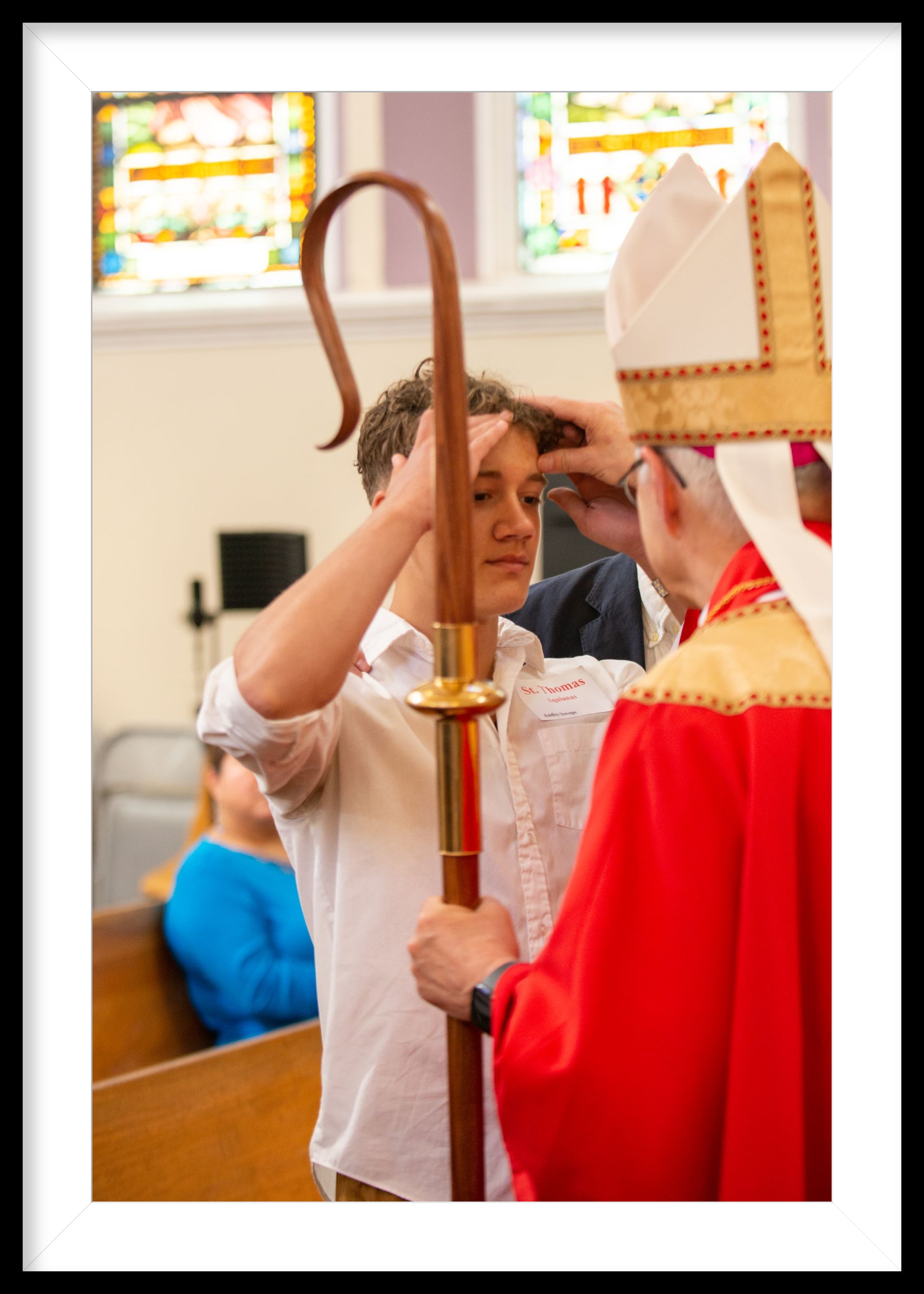
Confirmation, together with Baptism and Eucharist, form the Sacraments of Initiation that are all intimately connected. In the Sacrament of Confirmation, the baptized person is "sealed with the gift of the Holy Spirit" and is strengthened for service to the Body of Christ.
Basic Process
For confirmation celebrated under normal circumstances, the following information is to be entered in the Confirmation Register (can. 895):
- the legal and Christian names of the child or adult (use maiden name of a woman);
- the name of the father (first, middle if any, and surname) and the name of the mother (first, middle if any, and maiden name);
- the date and place of baptism;
- the name of the sponsor selected by the person;
- the date and place of the confirmation;
- the title and name of the minister performing the confirmation; e.g., “Bishop John SMITH” or “Father Joseph JONES”.
Candidates for confirmation, not baptized at Sacred Heart Church, must provide a baptismal certificate from the church of baptism in advance of the celebration of confirmation.
This facilitates in satisfying the obligation of notifying the parish of baptism about the conferral of confirmation.
Additional reasons for obtaining a baptismal certificate are:
- the fact of valid baptism and Catholicity will be established
- any previous reception of valid confirmation, especially in the case of Catholics baptized in Eastern Churches, will be uncovered
- any discrepancies between name and parentage provided in the Baptismal Register and given at the time of confirmation will be discovered
- the identity of baptismal godparents can be ascertained
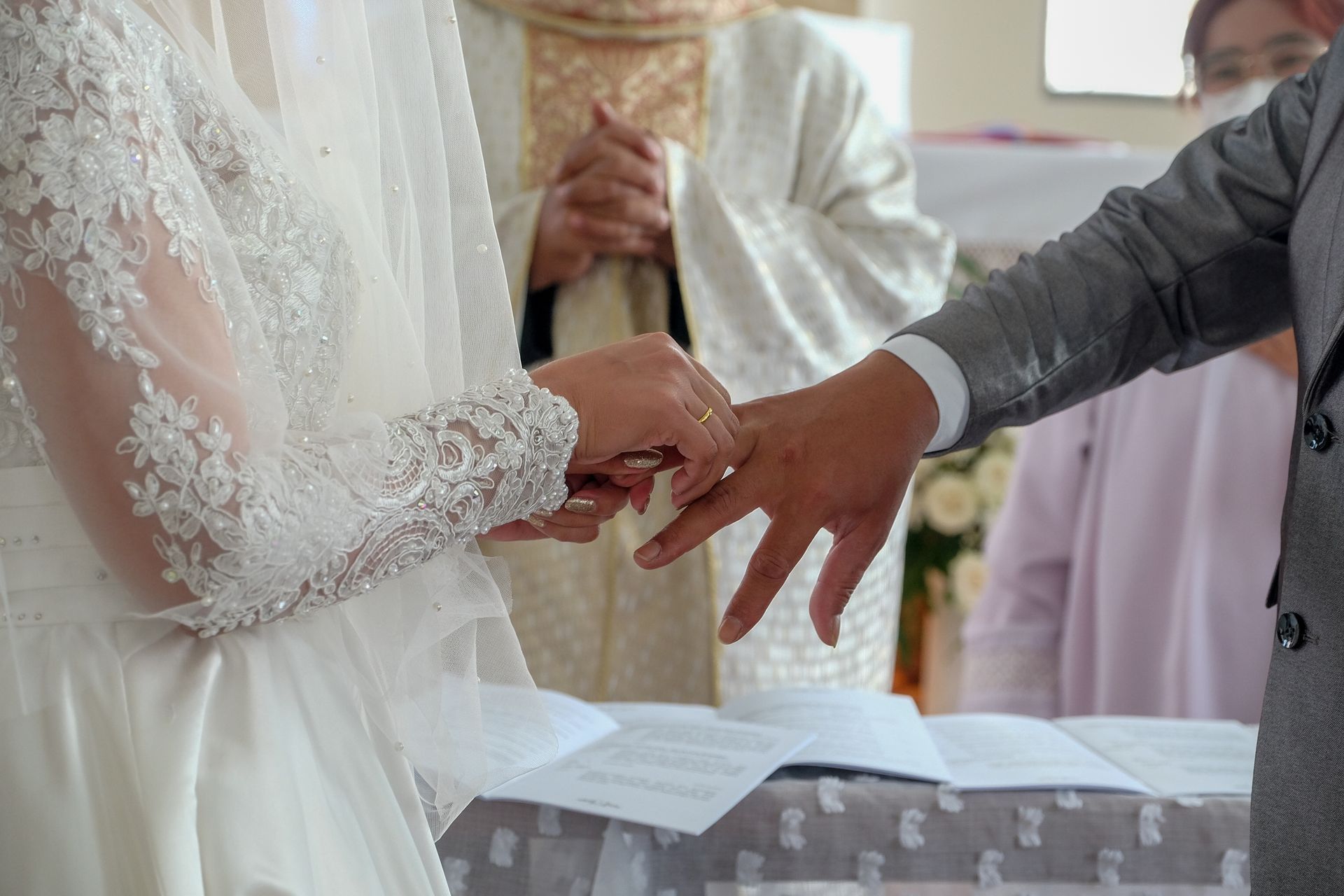
"The matrimonial covenant, by which a man and a woman establish between themselves a partnership of the whole of like, is by its nature ordered toward the good of the spouses and the procreation and education of offspring; this covenant between baptized persons has been raised by Christ the Lord to the dignity of a sacrament."
Weddings are celebrated throughout the year. In order to ensure proper sacramental preparation, engaged couples must arrange for their wedding with the priest at least six (6) months in advance of their anticipated marriage date. Parish membership and attendance at an Engaged Encounter weekend are required. Please contact the parish office by phone (256) 734-3730 for an appointment to begin the process of marriage preparation. Weddings are normally not celebrated during Lent.
For more information, please consult our Wedding Guidelines.
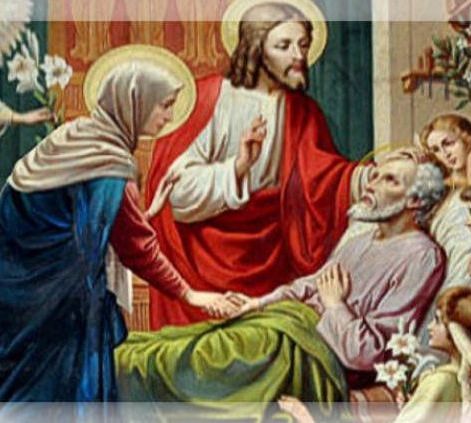
"Is there any among you sick? They should call for the elders of the Church and have them pray over them, anointing them with oil in the name of the Lord." James 5:14
The Catholic Sacrament of Anointing of the Sick, formerly known as Last Rites or Extreme Unction, is a ritual of healing appropriate not only for physical but also for mental and spiritual sickness.
In the Sacrament, through the ministry of the priest, it is Jesus who touches the sick to heal them from sin – and sometimes even from physical ailment. His cures were signs of the arrival of the Kingdom of God. The core message of his healing tells us of his plan to conquer sin and death by his dying and rising.
The Rite of Anointing tells us there is no need to wait until a person is at the point of death to receive the Sacrament. A careful judgment about the serious nature of the illness is sufficient.
When the Sacrament of Anointing of the Sick is given, the hoped-for effect is that, if it be God's will, the person be physically healed of illness. But even if there is no physical healing, the primary effect of the Sacrament is a spiritual healing by which the sick person receives the Holy Spirit's gift of peace and courage to deal with the difficulties that accompany serious illness or the frailty of old age.
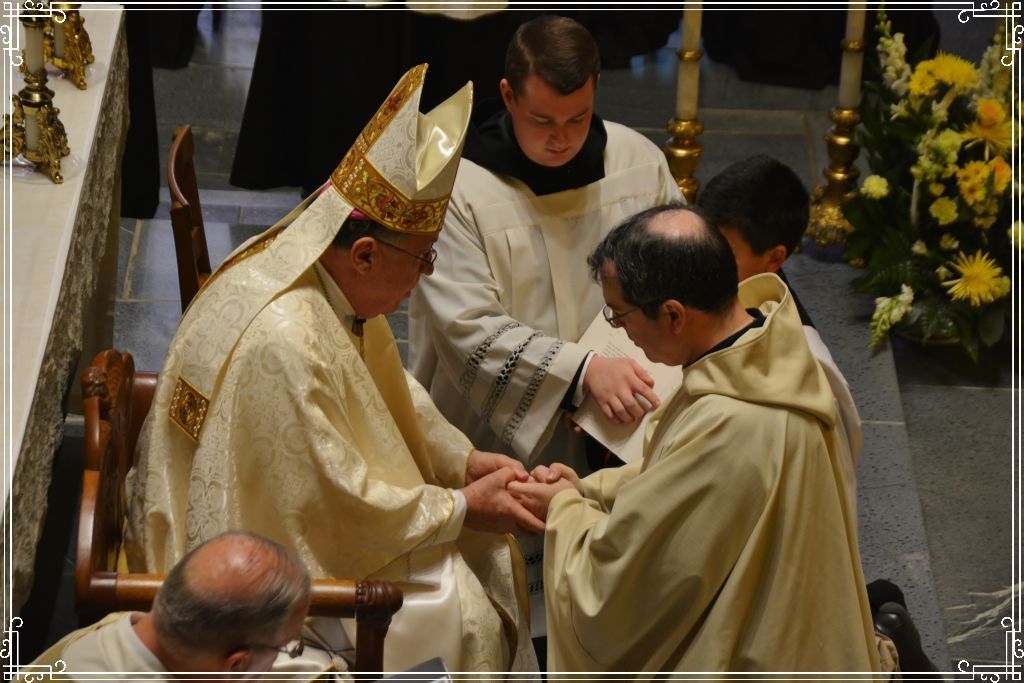
Holy Orders is the sacrament through which the mission entrusted by Christ to his apostles continues to be exercised in the Church until the end of time: thus it is the sacrament of apostolic ministry. In the Sacrament of Holy Orders, a man is incorporated into the priesthood of Christ, at one of three levels:
- the episcopate
- the priesthood
- the diaconate
In the Sacrament of Holy Orders, or Ordination, the priest being ordained vows to lead other Catholics by:
- bringing them the sacraments (especially the Eucharist),
- proclaiming the Gospel
- providing other means to holiness.
For Catholics, the church views typically that in the last year of seminary training a man will be ordained to the "transitional diaconate." This distinguishes men bound for priesthood from those who have entered the "permanent diaconate" and do not intend to seek ordination as a priest.
Deacons, whether transitional or permanent, receive faculties to preach, to perform baptisms, and to witness marriages. They may assist at the Eucharist or the Mass, but are not the ministers of the Eucharist.
After six months or more as a transitional deacon, a man will be ordained to the priesthood. Priests are able to preach, perform baptisms, witness marriages, hear confessions and give absolutions, anoint the sick, and celebrate the Eucharist or the Mass. Some priests are later chosen to be bishops; bishops may ordain priests, deacons, and bishops.


